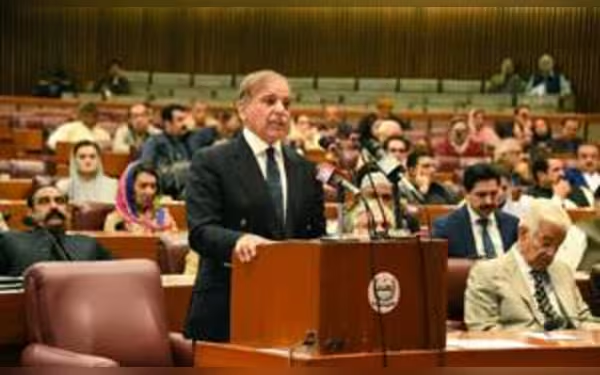Saturday, November 16, 2024 05:31 PM
Pakistan Government Shelves Judicial Reforms Amid Political Tensions
- Government shelves judicial reforms after failed negotiations.
- Maulana Fazlur Rahman remains a key political figure.
- Political consensus on constitutional package remains elusive.
 Image Credits: nation_pk
Image Credits: nation_pkThe Pakistan government has shelved its judicial reforms plan following failed negotiations with Maulana Fazlur Rahman, raising political tensions.
In a significant turn of events, the government of Pakistan has decided to shelve its proposed judicial reforms plan. This decision comes after last-ditch efforts to placate key political figure Maulana Fazlur Rahman failed to yield the desired results. The proposed amendments, which are crucial for the constitutional package, have not yet been presented before the cabinet, as clarified by the law minister. The Defence Minister has indicated that the government is actively seeking consensus on this constitutional package, but the situation remains tense.
The recent prorogation of both houses of Parliament—the National Assembly and the Senate—suggests that the ruling alliance is opting to delay the proposed constitutional package. This delay is aimed at resolving differences with smaller political parties and addressing their demands. To secure the necessary votes for constitutional amendments, the ruling coalition plans to engage in discussions with Maulana Fazlur Rahman, who currently holds a pivotal role in the political landscape of the country.
Despite the urgency of the situation, achieving consensus among all parties appears to be a daunting task in the current political climate. While the complete draft of the constitutional package may not receive approval, it is anticipated that several amendments could still be passed by garnering the required support in both houses. Senior politician Riaz Hussain Pirzada has expressed optimism, stating that the deadlock is unlikely to last more than a week. He described the situation as a "complete political show," suggesting that the reservations and demands related to the draft will eventually be addressed.
Former Attorney General Ashtar Ausaf Ali emphasized the necessity of the constitutional amendment, although he acknowledged that not all proposed changes may be approved. He expressed his belief that Justice Mansoor Ali Shah could be appointed as Chief Justice. During the National Assembly proceedings, lawmakers from the treasury benches appeared confident about the approval of the constitutional package, with Defence Minister Khawaja Muhammad Asif asserting that the government aims to achieve maximum consensus.
As the discussions unfold, Minister for Law Azam Tarar has pointed out that the controversial constitutional package has not yet been presented to the federal cabinet. He clarified that a constitutional amendment must first receive clearance from the cabinet before proceeding. Tarar expressed hope that constructive dialogue with opposition parties would lead to positive recommendations rather than mere criticism.
PPP’s MNA Naveed Qamar echoed the sentiment for a congenial environment for discussions, while MQM-P’s Farooq Sattar stressed the importance of strengthening local governments as part of the constitutional package. On the other hand, PTI leader Asad Qaiser has threatened to boycott parliamentary sessions, labeling the proposed package as "fraud" and asserting that his party will take to the streets in protest.
The indefinite adjournment of both houses of Parliament has raised concerns about the political ramifications for the ruling coalition. The government's inability to pass the controversial constitutional amendment bill has led to embarrassment and criticism from its allies. As the political landscape continues to evolve, the future of the proposed judicial reforms remains uncertain, leaving many to wonder how this will impact governance and the rule of law in Pakistan.
The shelving of the judicial reforms plan highlights the complexities of Pakistan's political environment. As the government navigates through these challenges, the need for effective dialogue and consensus-building becomes increasingly critical. The outcome of these discussions will not only shape the future of the constitutional package but also influence the broader political stability of the country.













